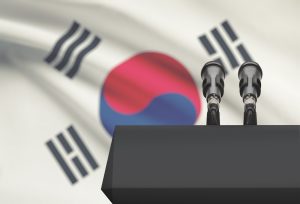Then-President Yoon Suk-yeol’s declaration of martial law in December set off a series of constitutional and political crises in South Korea which lasted until President Lee Jae-myung assumed office on June 4. The country has been significantly polarized between those condemning Yoon for destroying the hard-won democratic system and those who unconditionally justify Yoon’s acts – even after the Constitutional Court unanimously removed him from office on April 4, finding his declaration of martial law to be illegitimate.
The main conservative party in South Korea has now had two consecutive presidents impeached and removed from office over egregious abuses of power: Park Geun-hye in 2017 and Yoon Suk-yeol in 2025. Given this tragic history many argued that it is the time to reform the People Power Party (PPP). However, the campaign for the party leadership post last month clearly showed that the party members do not have any interest in making changes.
Jang Dong-hyuk, a two-time lawmaker, defeated Kim Moon-soo, a former presidential candidate of the PPP who was also the labor minister for Yoon, during the final stage of the party leadership election held last week. In the PPP’s recent party leadership election, the votes of the party members count for 80 percent of the total votes. The remaining 20 percent of votes represented the general public. What it means is that the PPP heavily values party members’ support for candidates – even if the party members and the general public support different politicians.
Thus Kim – who outpolled Jang in the general public by more than 20 percentage points – could not win the election. Jang succeeded in appealing to the PPP’s base with his pro-Yoon sentiment and hawkish stance against the Lee administration during the campaign. He won the election by a margin of just 0.54 points against Kim. Ironically, the results suggest that some PPP members who had supported Kim to be their presidential candidate changed their mind to support Jang, even though nothing has changed with Kim’s stance on Yoon or the party’s overall direction.
In his victory speech, Jang said he will work with the conservatives to drag down the Lee administration. He also indirectly appreciated the right-wing online media and YouTubers who helped consolidate his support base among the party members.
Considering the PPP’s unchanged stance on Yoon and its decision to elect Jang as the party leader, the clashes between the ruling Democratic Party (DP) and the PPP will likely aggravate going forward. The DP is led by Jung Chung-rae, a hardline pro-Lee lawmaker who has reiterated the necessity of carrying out reform packages overhauling the prosecution, press, and judicial branch. Although Lee showed his intention to work with the PPP by offering to have a meeting with Jang as soon as possible, the DP itself is unlikely cooperate with the PPP in the National Assembly. According to the DP, the so-called “insurrection” crisis caused by Yoon’s martial law is still ongoing with no sincere apologies and recognition of the PPP on the event. When the National Assembly voted to lift martial law in December, the majority of the PPP lawmakers did not cooperate with it. They also scuttled the Democratic Party’s first attempt to impeach Yoon, and only a handful of PPP members voted for impeachment in the successful second attempt.
As the DP already holds the majority of the 300-seats in the National Assembly – and the next general elections are not until 2028 – it has no need to work with the PPP. That means the two biggest parties in the country will continue to confront each other. In the meantime, the public’s evaluation of each party will be reflected in the local elections scheduled next year.

































